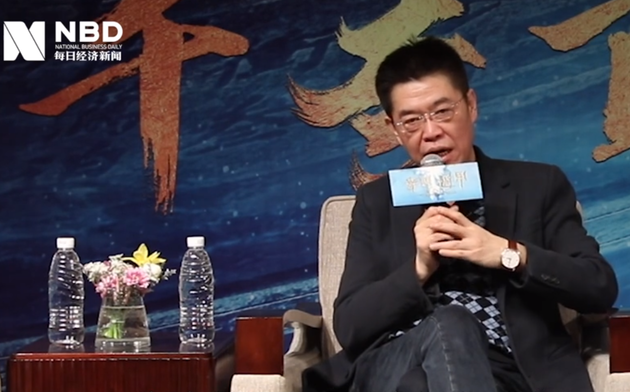Dec. 18 (NBD) -- The fantasy actioner "Thousand Faces of Dunjia" produced by Le Vision Pictures has earned 218 million yuan (32.9 million U.S. dollars) over four days as of 9pm on Sunday.
It is noteworthy that in each single road show of the movie, Le Vision Pictures' CEO Zhang Zhao showed up to promote the movie personally.
Zhang Zhao has had a long career in China-U.S. co-production and has founded two of China's biggest private-sector studios. In 2012, The Hollywood Reporter called him the flagbearer for the "renaissance" of China’s film industry.
Companies backed by LeEco have been greatly affected by the crisis clouding LeEco, and Le Vision Pictures is no exception.
Zhang acknowledged the negative influence yet expressed his confidence in recovering and vitalizing Le Vision Pictures and its sister company Le.com in an exclusive interview with NBD.

Zhang Zhao, CEO of Le Vision Pictures (Photo/NBD)
Le Vision Pictures is well-prepared and directed
NBD: Why do you personally promote the Thousand Faces of Dunjia in each road show?
Zhang: For one thing, I personally promoted the movie everywhere is to enhance the communication with our partners; for the other thing, I want to take the lead on hard work and lift the spirits of my colleagues.
NBD: Le Vision Pictures didn't post a satisfying report in box office this year. Did the films generate enough income as expected?
Zhang: I'd rather not disclose financial details. I should say that I had expected the negative influence of troubles facing LeEco on Le Vision Picture.
But the reason why our company's performance was not as good as last year also lies in challenges of China's film market, which is more of my concern.
NBD: Several senior executives had left LeEco and its subsidiaries, did Le Vision Pictures find it in the similar situation?
Zhang: Be it a senior executive or a common employee, the staff of Le Vision Picture is stable. Our company keeps vigilant, takes precautions and gets prepared in advance in terms of thoughts, resources and details.
Two year ago, I bought lots of IPs (Intellectual Properties), a decision made from the angle of venture capital. From where I stood, I believed that the film industry would eventually enter such a stage where IPs become the basis for changes of the industrial model.
Our company is well prepared and directed, which keeps employees together. We think strategically and make farsighted investment plans for at least a decade ahead. I don't think that our team will be confronted with internal crisis.
NBD: IP management needs large capital investment and Le Vision Pictures has moved to offices which were occupied previously by LeSports. Does your company have a tight budget?
Zhang: Moving in to new offices is to save money but the cash flow runs normally. Steps are clear: firstly, to restore the employees' morale through making concerted efforts, such as pulling together everyone's strengths in producing and marketing "Thousand Faces of Dunjia"; secondly, to sort out our business model; thirdly, to seek greater development which entails new financing.
The good news is the new round financing is now under progress. What we need is to do it right at every step.

Photo/NBD
IP management should target precise audience
NBD: You mentioned earlier that problems exist in China's film industry, can you be more specific?
Zhang: Time cost of going to the cinema is increasing compared to watching a movie on the Internet, which is the first problem facing the film industry.
Some industry participants haven't come to realize the film industry is a business model based on its influence. The value of its influence are not fully exploited yet.
The key to Walt Disney's success is that the company doesn't hover on movies, but also produce other products based on IPs.
Movies should be regarded as the medium of the IP influence. Once the influence takes root, other derivatives including spin-offs and games can be launched, which will in return push the box office of the next movie.
NBD: You value IP influence a lot and Le Vision Picture has shifted from a film & TV company to an IP manager and operator. What is your plan for the vertical operation of IPs?
Zhang: Films constitute the core business of the entertainment industry, which itself is an economic model of influence.
Films and the box office are two different concepts. Films shouldn't rely solely on the box office to make money, and it should also count on their derivatives. It's important to build an IP and to thoroughly exploit its value of influence, so as to make profits. This is the healthy development of the film industry.
NBD: You pointed out earlier that your company owns many IPs and IP operation should target different audience, which is called demassification. It's a special point of view which accords with the Internet characteristics. Can you elaborate on this?
Zhang: Simply put, different contents should show different points of focus. For instance, the "Thousand Faces of Dunjia" targets young audience aged around 25 in the second-, third- and fourth-tier cities in China, therefore no limited release was launched in Beijing, Shanghai, Guangzhou and Shenzhen.
As I said on many occasions, do not expect people who are fond of "Coming Home", a Chinese historical drama film, to like romance movie "Tiny Times".
Each IP should target the right audience.
Email: gaohan@nbd.com.cn


 川公网安备 51019002001991号
川公网安备 51019002001991号





